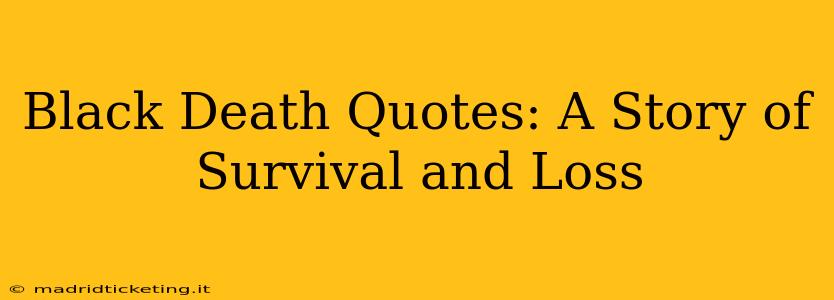The Black Death, a bubonic plague pandemic that ravaged Europe and beyond in the mid-14th century, left an indelible mark on history. More than just a catastrophic event, it fundamentally reshaped societies, economies, and even religious beliefs. While we don't have firsthand accounts from the majority of victims (many succumbed before they could record their experiences), the surviving writings—both fictional and factual—offer chilling glimpses into the terror, despair, and resilience of those who lived through this horrific period. Exploring quotes from this era allows us to connect with the human experience of the Black Death, understanding not just the statistics, but the personal stories behind the numbers.
What were the most common symptoms of the Black Death?
The Black Death presented itself in several terrifying forms: bubonic, septicemic, and pneumonic plague. While the specifics varied, common symptoms included fever, chills, swollen lymph nodes (buboes, giving the bubonic plague its name), intense pain, and dark, necrotic lesions on the skin. Septicemic plague, a rapidly fatal form, often resulted in internal bleeding and a characteristic blackening of the skin. Pneumonic plague, spread through the air, caused respiratory distress and coughing, further fueling the pandemic's spread. The sheer speed and brutality of the illness is consistently highlighted in historical accounts, leaving little time for effective treatment or even farewells.
How did people try to treat the Black Death?
Unfortunately, effective treatments for the Black Death were nonexistent during the 14th century. Medical understanding was rudimentary, and many proposed treatments were ineffective or even harmful. Common practices included bloodletting (often exacerbating the problem), applying poultices of herbs and other substances to buboes, and relying on prayer and religious rituals. The desperation of the time is evident in the diverse and often bizarre "remedies" attempted. Some accounts mention the use of vinegar, arsenic, and other potentially toxic substances. The lack of effective treatment fueled widespread panic and fear, further hindering attempts at containment.
What did people believe caused the Black Death?
The causes of the Black Death remained a mystery at the time, leading to various explanations, many steeped in superstition and religious interpretations. Some blamed divine punishment for human sin, leading to widespread flagellation and public displays of penance. Others attributed the plague to astrological influences or miasmas—bad air—believing it was spread through foul odors. The lack of scientific understanding fueled fear and mistrust, making it difficult to implement effective public health measures. This lack of understanding is reflected in many contemporary writings, which often illustrate the prevailing beliefs of the time rather than any factual understanding of the disease's transmission.
Did the Black Death change society?
The Black Death profoundly reshaped European society. The immense loss of life disrupted the feudal system, leading to labor shortages and increased bargaining power for surviving workers. The plague also fueled social unrest and religious upheaval, with some questioning the authority of the Church. The impact extended beyond Europe, affecting populations across Asia and Africa, leading to long-term demographic, economic, and social consequences that continue to be studied today. The sheer scale of death led to significant societal shifts, reshaping power dynamics and contributing to major historical changes.
What quotes from survivors exist detailing their experiences?
Unfortunately, directly attributable quotes from everyday survivors of the Black Death are scarce. Most written records come from chroniclers, religious figures, or those from higher social strata. However, the tone of these writings consistently conveys the horrific reality: the sheer volume of death, the pervasive fear, and the breakdown of social order. The overall message resonates with a chilling sense of mortality and the fragility of life. While exact quotes directly from victims are difficult to definitively verify, the accounts from chroniclers painting vivid pictures of the plague's impact allow us to indirectly hear the voices of those who perished.
Conclusion
The Black Death remains a stark reminder of humanity's vulnerability in the face of devastating pandemics. While we lack many direct accounts from individual survivors, the surviving documents and writings provide a glimpse into the fear, loss, and societal upheaval of this devastating period. By examining historical accounts and interpreting their collective message, we can gain a deeper understanding of this pivotal moment in history and its lasting impact on our world. The story of the Black Death is not just about death and despair, but also about resilience, adaptation, and the enduring strength of the human spirit.

